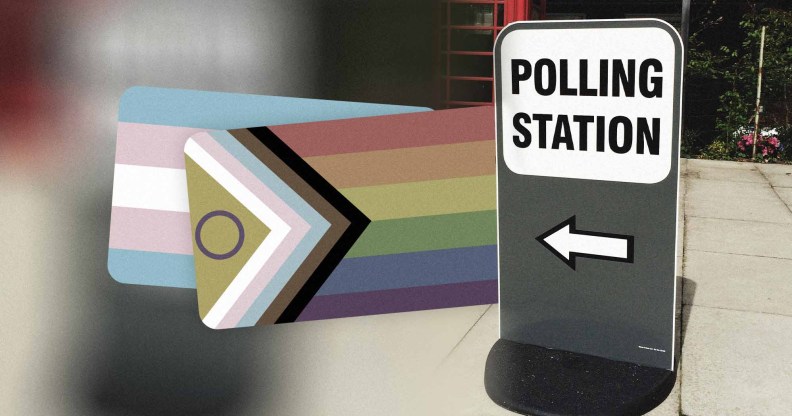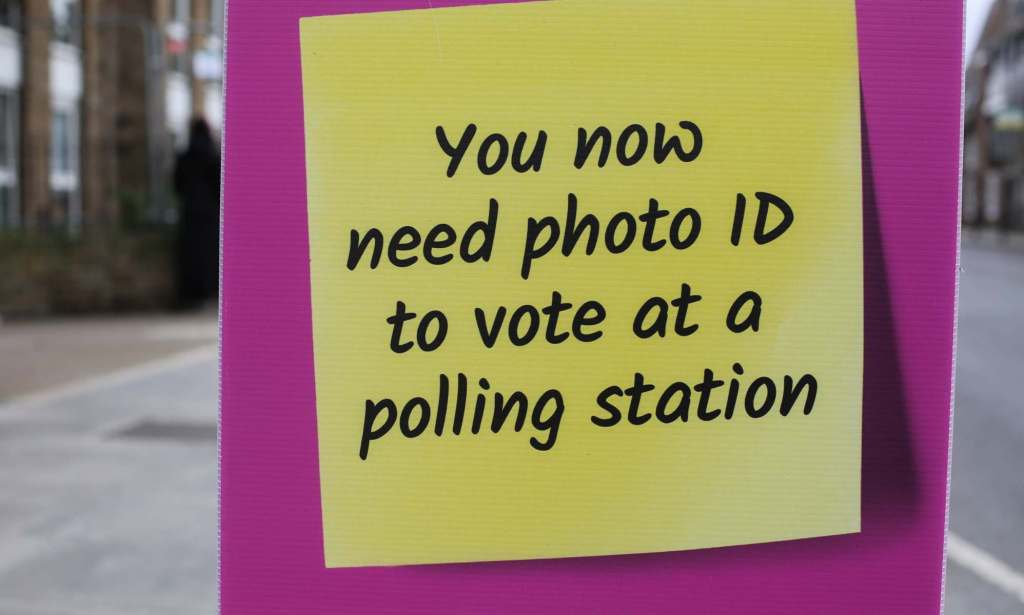UK voter ID: What trans and non-binary people need to know ahead of the general election

This is what trans and non-binary people need to know about voter ID (Getty)
For the first time, voters in a UK general election will be required to bring photo ID to polling stations – something which could disenfranchise trans and non-binary voters wanting to exercise their democratic right.
To help prevent this, PinkNews has teamed up with the Electoral Commission to ensure voters are fully informed about what ID is acceptable on 4 July.
Compulsory voter ID came into force under the 2022 Elections Act, with the Conservative government saying it would protect the “integrity” of elections from serious voter fraud. The change means polling station staff will verify each voter’s name and photograph to ensure it matches what is on the electoral register.
While gender markers are irrelevant for the purposes of voter ID, under the law, people won’t be allowed to cast their vote if the relevant officer thinks there’s “reasonable doubt” that the person isn’t who they claim to be, based on their photo ID.
The move was seen as deeply controversial, with some MPs, civil rights groups, unions and charities comparing it to “voter suppression” for trans, Black and disabled voters – those less likely to have valid photographic ID – and questioned the rationale behind the law given the low levels of electoral fraud.
There were just 11 convictions in the past five years, according to Electoral Commission data.
Research by Stonewall and the LGBT Foundation previously found that nearly a quarter of trans and 19 per cent of non-binary respondents said they do not own ID that would be legally recognised.
Amid concerns trans and non-binary people could become disenfranchised by the new system, the Electoral Commission – the organisation responsible for overseeing elections and promoting voter registration – has worked with PinkNews to create an easy-to-understand guide.

What ID can I use to vote?
Acceptable forms of ID – which can be expired as long as the voter is recognisable – include:
- Passport – issued by the UK, any of the Channel Islands, the Isle of Man, a British Overseas Territory, a European Economic Area (EEA) state or a Commonwealth country
- Photo driving licence (including provisional) – issued by the UK, any of the Channel Islands, the Isle of Man, or an EEA state
- Blue disability badge
- Identify card with Proof of Age Standards Scheme (Pass) mark
- Certain concessionary travel cards
- Biometric immigration document
- Defence/veteran identify card
- National identity card – issued by EEA state
What happens if I don’t have recognised ID?
You will not be allowed to vote without ID.
Voters who do not have an accepted form of ID, can apply for a free voter authority certificate.
What is a voter authority certificate?
A voter authority certificate does not have a gender marker and polling station staff will receive training on how to check this form of ID sensitively and voters can have this done in private.
Anyone who does not want to vote in person on 4 July can apply to vote by post or by proxy. Voters can apply at voter-authority-certificate.service.gov.uk or by completing a paper form and sending it to their local council.
When applying for a voter authority certificate, you will need to provide your name, address, date of birth and national insurance (NI) number, which can be found on the free HMRC app, payslips, a P60, and on official letters about tax, benefits and pensions. You will not need to provide your gender because the certificate will not have a gender marker.
You should apply using the same name you used to register to vote.
You can still apply if you don’t know your NI number, or don’t have one, but will need to provide other forms of proof of identity, such as a birth certificate, bank statement and a utility bill. Your local council will contact you to arrange this.
If you don’t have any other accepted proof of identity, you can ask someone you know to confirm your identity. This is known as an attestation.
When do I have to apply for a voter authority certificate by?
- If you’re in England, Scotland or Wales, you can apply for free voter ID now. The deadline is 5pm on Wednesday 26 June.
- If you’re in Northern Ireland, you can apply for an electoral identity card. The deadline is 11.59pm on Wednesday 26 June.
What happens if the name on my ID does not match the electoral register?
The name on a voter’s photographic ID, whether their own or the free document issued by local councils, should be the same name they used to register to vote.
If you have changed you name and have not yet updated it on the electoral register, you can apply to do so before the election. Contact your local council and ask for the relevant forms.
Can I be turned away if my ID photo no longer matches how I look in person?
Yes. If you do not have photo ID, feel worried about using an existing form of ID which has a gender marker, or aren’t sure whether you still look like the photo on your ID, you should apply for free voter ID.
Expired photo ID will be accepted if the photo remains a good enough likeness for polling station staff to be able to identify you.
Do I need to take my Gender Recognition Certificate to the polling station?
No. However, your photo ID needs to match the name on the electoral register and include a photo that is a good likeness. Again, if you feel concerned about using an existing form of ID which has a gender marker, you should apply for free voter ID.
You may want to contact your local elections team to check how your name appears on the register if you are unsure.
Key dates you need to know
- The deadline to register to vote is midnight on Tuesday 18 June.
- The deadline to register for a postal vote is 5pm on Wednesday 19 June.
- The deadline to register for a proxy vote is 5pm on Wednesday 26 June.
- The deadline for applying for a free ID is 5pm on Wednesday 26 June.
How did this story make you feel?

